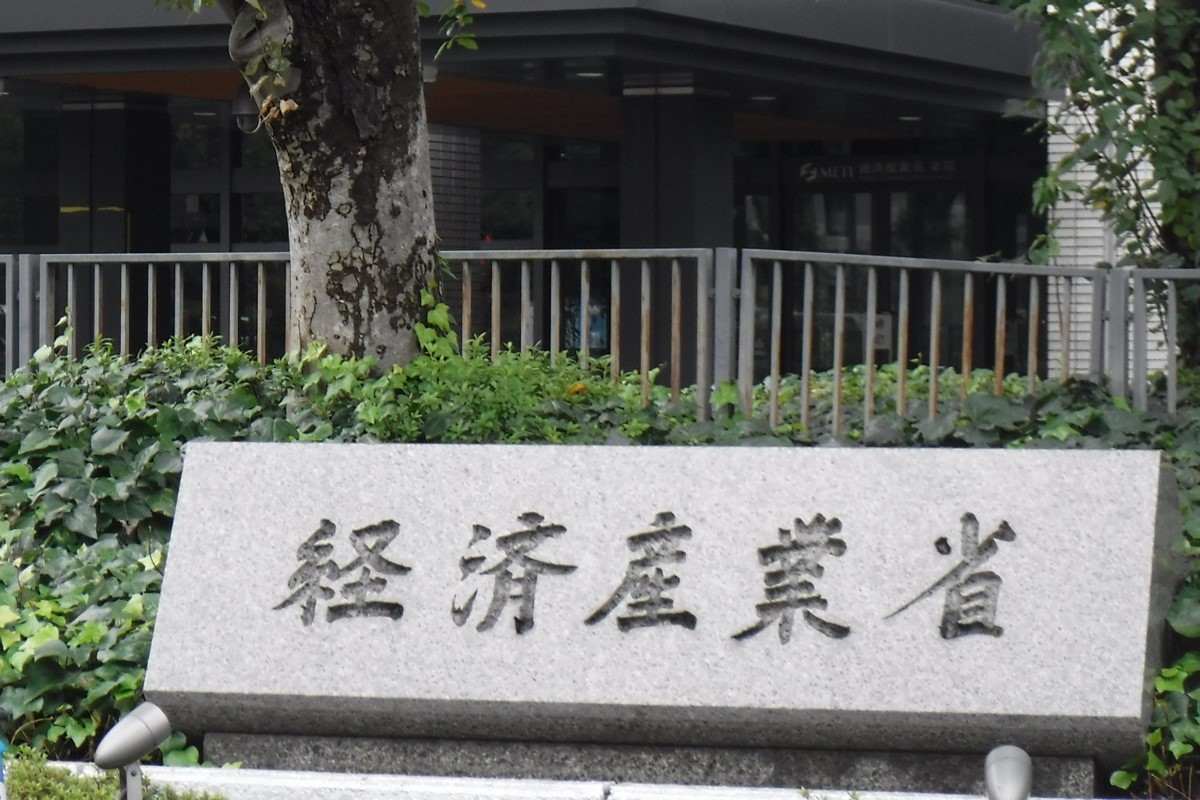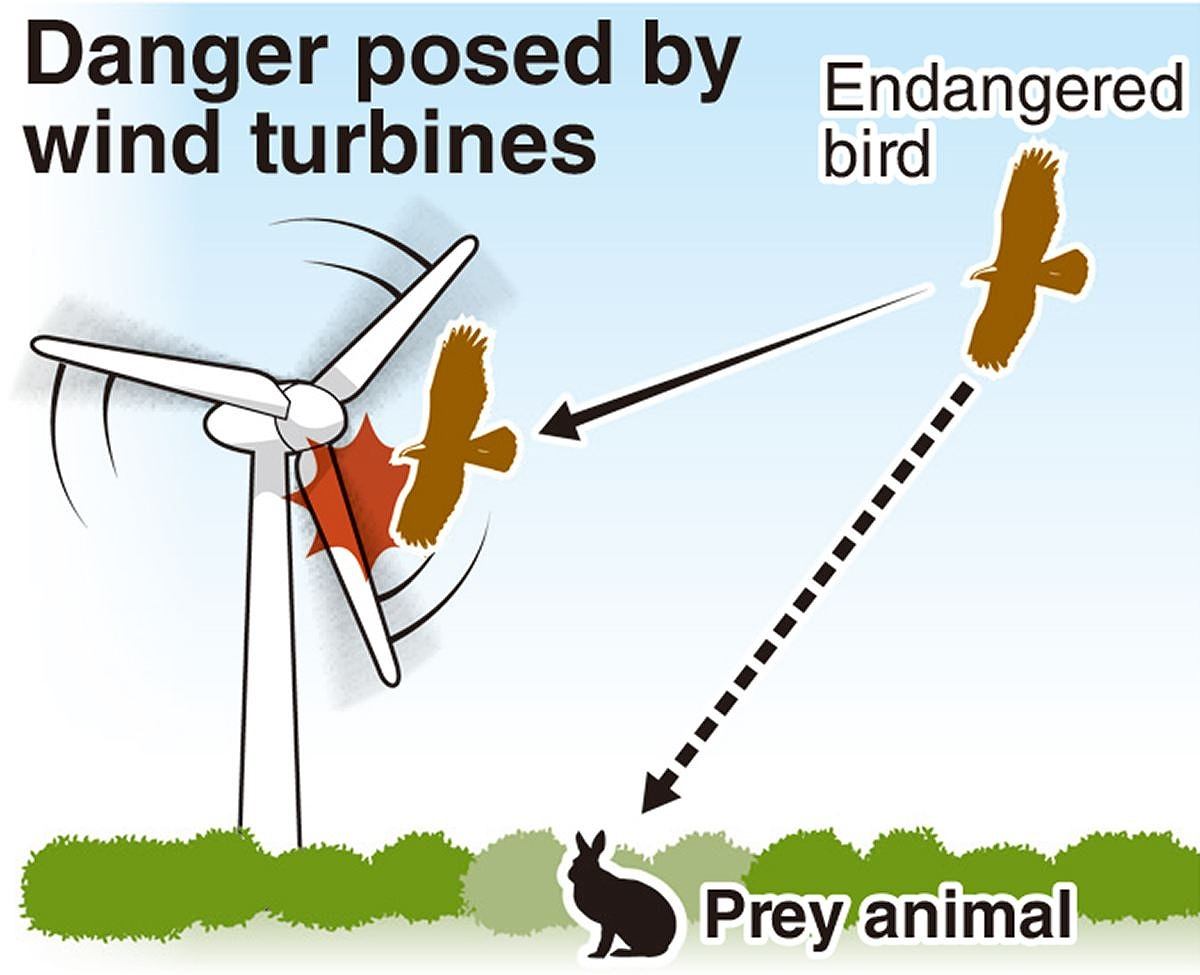
The Economy, Trade and Industry Ministry building in Chiyoda Ward, Tokyo.
6:00 JST, August 6, 2023
The central and local governments have suspended a number of wind farm construction projects over concerns about the protection of endangered birds.
Japan is currently pursuing wind power as a source of clean energy with an eye on reducing carbon dioxide emissions, but fears have also been voiced over wind turbine strikes on rare avian species.
There have been many cases in which imperiled birds of prey — including golden eagles and mountain hawk-eagles — have been killed in bird strikes both domestically and overseas, giving rise to the key issue of balancing decarbonization and the preservation of important species.
Full-scale review

In May, the Economy, Trade and Industry Ministry asked Green Power Investment Corp. to “drastically review its business plan” for a wind power generation facility in a mountain forest straddling Shiga and Fukui prefectures, citing “concerns over the impact on golden eagles.” The ministry noted that mountain hawk-eagles are “highly likely to collide with wind turbines.”
The Tokyo-based company plans to construct 39 188-meter-high wind turbines across an 830-hectare site. According to the two prefectures, a draft environmental impact statement submitted by the firm in March 2022 — under the Environmental Impact Assessment Law — stated that golden eagles “do not live in the area.”
However, according to a nature conservation group and other sources, there were two pairs of golden eagles and 11 pairs of mountain hawk-eagles living in the area at the time.
The Environment Ministry’s guidelines on the construction of wind power facilities require that bird protection be considered when choosing locations. The guidelines also state that steps should be taken to prevent birds from colliding with wind turbines.
The Environment Ministry and Shiga and Fukui prefectures submitted an opinion letter to the economy ministry, claiming the company had not done enough to move its construction plan forward.
After receiving the letter, Green Power Investment told The Yomiuri Shimbun, “We will carefully study the recommendation and consider our next moves.”
According to the economy ministry’s website, the ministry made 61 recommendations relating to preparatory environmental assessment documents over the past five years. Of these, 47 related to projects that could endanger rare birds of prey, including in Fukushima, Shizuoka, Kochi, Kagoshima, Shiga and Fukui prefectures.
Although such recommendations are not legally binding, they likely make it difficult for businesses to obtain approval for construction projects if they fail to utilize concrete bird-strike countermeasures.
Uptick in interest
An increasing number of businesses have been building wind power generation facilities in recent years. An official of the Environment Ministry’s Wildlife Division said many such projects are currently underway in mountain forests across the country.
One reason for the recent trend is the government’s pursuance of decarbonization to help combat global warming. As of fiscal 2019, there were about 2,500 wind turbines across the nation. Though these turbines only account for 0.7% of all the electricity generated in Japan, the government sixth’s Strategic Energy Plan — formulated in 2021 — states an aim to raise this figure to 5% by fiscal 2030.
Another reason for an increased interest in wind power is that technological innovation has lowered power-generation costs, giving rise to higher hopes for profit.
However, many businesses embark upon wind power projects without sufficient regard for rare birds of prey. According to the Tokyo-based Nature Conservation Society of Japan, mountain hawk-eagle and golden eagle habitats lived respectively in 52% and 21% of 267 proposed sites for onshore wind power generation during and after 2018.
It is thought there are only about 500 golden eagles and 1,800 mountain hawk-eagles in Japan.
“Businesses should avoid building wind power generation facilities in the habitats of such birds,” a representative of the association said. “Generally [such firms] lack consideration for the environment.”
Top Articles in Society
-

Producer Behind Girls Group XG Arrested for Cocaine Possession
-

Man Infected with Measles Reportedly Dined at Restaurant in Tokyo Station
-

Man Infected with Measles May Have Come in Contact with Many People in Tokyo, Went to Store, Restaurant Around When Symptoms Emerged
-

Woman with Measles Visited Hospital in Tokyo Multiple Times Before Being Diagnosed with Disease
-

Australian Woman Dies After Mishap on Ski Lift in Nagano Prefecture
JN ACCESS RANKING
-

Japan PM Takaichi’s Cabinet Resigns en Masse
-

Japan Institute to Use Domestic Commercial Optical Lattice Clock to Set Japan Standard Time
-

Israeli Ambassador to Japan Speaks about Japan’s Role in the Reconstruction of Gaza
-

Man Infected with Measles Reportedly Dined at Restaurant in Tokyo Station
-

Videos Plagiarized, Reposted with False Subtitles Claiming ‘Ryukyu Belongs to China’; Anti-China False Information Also Posted in Japan



















